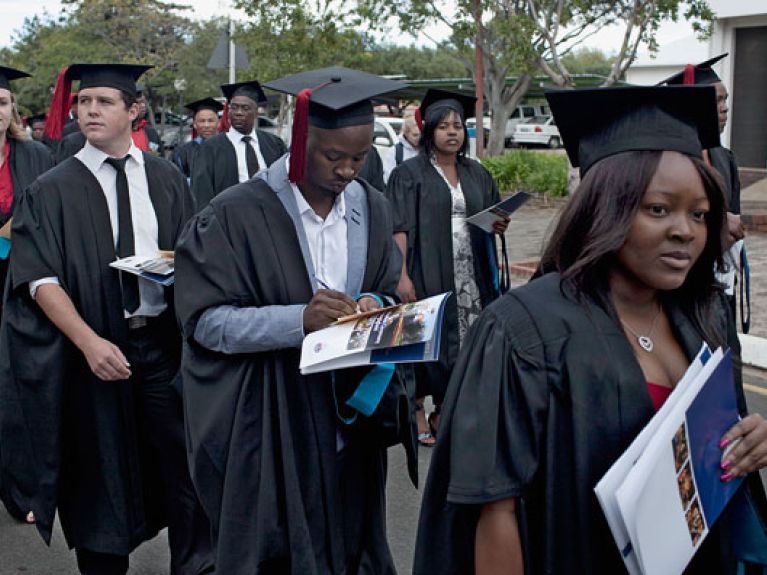Great opportunities for talented young people
The future of Africa lies in the hands of Africa’s young professionals. Germany is working as a partner in education and research to improve their chances and prepare them for the challenges their countries face.

Gabriel Moongela achieved what he wanted: one year ago, he began working as a procurement specialist at Coca-Cola Sabco, the South African bottling company. And the young African managed this although his start in life was far from ideal. “I grew up in rather humble circumstances,” says Moongela. Instead of simply accepting that, however, he always believed in himself and his potential. “Someone’s personal background must never decide whether they are successful or not. Everyone should be able to make full use of their opportunities.” Moongela succeeded above all because of his persistence, hard work – and the support of the German Academic Exchange Service (DAAD).
For many years now, the DAAD, together with the Federal Foreign Office, has been supporting the training of talented Master’s and PhD students in a total of eight centres of excellence in Africa. One of these centres is the Namibian-German Centre for Logistics at the Namibia University of Science and Technology in Windhoek, where Gabriel Moongela completed his Master’s degree. Cooperation with the Flensburg University of Applied Sciences opens up new prospects for students and professors both in Africa and Germany and stimulates intercultural exchange and the formation of important networks. This cooperation aims to develop leadership personalities on the African continent, especially against the background of the labour market’s increasing demand for qualified specialists and young professionals.
“You can start from the very bottom and still become an outstanding manager,” says Janntje Böhlke-Itzen, project manager at the Flensburg University of Applied Sciences. “We must not ignore the potential of African countries, such as Namibia, but invest in excellent young talent.” The seven other centres of excellence are located in Ghana, Tanzania, South Africa, Kenya and the Democratic Republic of Congo. Each centre of excellence is devoted to a different field. The subjects range from development research and jurisprudence to international criminal law and economic crime to microfinance. The graduates are intended to act as opinion leaders and pass their knowledge on in their countries – to counteract the “brain drain” in Africa.
The eighth DAAD centre of excellence, the Kenyan-German Centre for Mining, Environmental Engineering and Resource Management (CEMEREM), is currently being set up. Based at Taita Taveta University College (TTUC) in southern Kenya, the centre, which aims to attract the young African elite in the raw materials sector, is a joint project of the Dresden University of Applied Sciences and the Technische Universität Bergakademie Freiberg which receives DAAD funding. Like many African countries, Kenya is also rich in mineral resources, such as gold, iron, zinc, coal and oil. Until now, however, there has been a lack of knowledge about how to use resources in a sustainable way. There have been practically no appropriate training facilities associated with the fields of mining, geosciences and environmental technology.
That is now all set to change when CEMEREM opens. “The establishment of CEMEREM at Taita Taveta University College in Voi is a milestone of German-African cooperation in science and research,” says Veronika Bellmann, Bundestag deputy and member of the Union Working Group Africa in the Bundestag. According to Bellmann, education and economic development in Africa are help towards self-help and therefore the most effective way of reducing the causes of migration.
There are concrete plans to establish appropriate degree courses, to develop a range of continuing education programmes and to equip laboratories within the CEMEREM framework. In addition to this, support is to be provided for collaborative PhD partnerships and the development of networks with industrial partners in Germany and East Africa. And last, but not least, it is planned to cultivate academic and intercultural exchange at student and professor level.
A total of 10.2 million people are studying in higher education today in Africa, 5.2 million of them in sub-Saharan Africa. Within the framework of its Africa strategy, the Federal Ministry of Education and Research (BMBF) aims to systematically expand cooperation with Africa in the fields of education and research over coming years. One measure is the establishment of a total of five research chairs at the African Institute for Mathematical Sciences (AIMS). This pan-African network is an association of various centres of excellence where elite African postgraduate students will be trained to the highest standard in mathematics and related subjects.
“AIMS will attract talented young Africans into mathematics and all the subjects based on it,” says Georg Schütte, State Secretary at the BMBF. “We are supporting them in these institutions so that they can think ahead independently, solve problems and shape Africa’s academic and economic future.” The CVs of the first alumni prove that the work of AIMS has already borne fruit. Today, one of them, Gaston Mazandu, is working in the fight against Ebola as a bioinformatics specialist. And another alumna, Tabitha Gathoni Mundia, is playing a leading role in the development of mobile payment systems in the African finance industry. ▪
Ellen Bolduan

